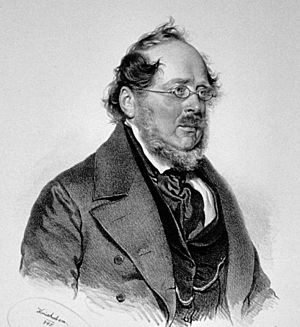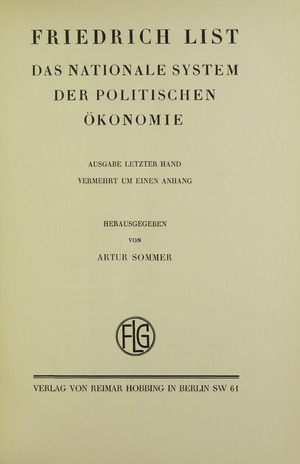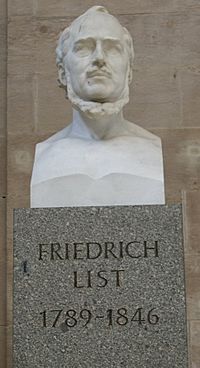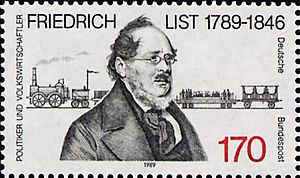Friedrich List facts for kids
Quick facts for kids
Friedrich List
|
|
|---|---|

Lithography of List by Josef Kriehuber, 1845
|
|
| Born | 6 August 1789 Reutlingen, Duchy of Württemberg, Holy Roman Empire
|
| Died | 30 November 1846 (aged 57) Kufstein, County of Tyrol, Austrian Empire
|
| Nationality | German American |
| Field | Economics |
| School or tradition |
Historical School |
| Influences | Jean-Antoine Chaptal · Alexander Hamilton · Daniel Raymond · Adolphe Thiers |
| Contributions | National System of Innovation Historical school of economics |
| Signature | |
Georg Friedrich List (born August 6, 1789 – died November 30, 1846) was a German-American economist and political thinker. He created a new way of thinking about how countries should manage their money and trade, called the nationalist theory of political economy. This idea became important in both Europe and the United States.
He was a key figure in the German historical school of economics. List strongly supported the Zollverein, which was a customs union that helped German states trade freely with each other. He believed that countries should put taxes (called tariffs) on goods coming from other countries. This would protect their own industries. He saw these tariffs as an investment in a nation's future success.
List was also a political liberal, meaning he believed in individual rights and freedoms. He worked with others on a political encyclopedia that supported constitutional liberalism. This idea meant that a country's government should follow a constitution. At the time, liberal and nationalist ideas were often connected in Europe. Some experts see List as an early thinker like John Maynard Keynes, who also believed in a "moderate or regulated capitalism."
Contents
Biography
Early Life and Education
Friedrich List was born in Reutlingen, Germany, on August 6, 1789. His father, Johannes, was a successful leather maker and a city official. Friedrich was the second son and youngest child in his family. He went to the town's Latin School.
List didn't enjoy working with his hands in his father's business. Instead, he started working as a clerk in government offices. He passed his exams and became a commissioner for taxes and warehouses.
University and Early Career
At age 23, List got a promotion and moved to Tübingen. There, he often attended lectures at the University of Tübingen and read many books. He also met important people, including future government ministers.
In 1816, his position in the government improved. He quickly moved up and became the first Professor of Administration and Politics at the University of Tübingen. As a representative in the Württemberg assembly, he pushed for government reforms. Because of his strong views, he was removed from his position. In April 1822, he faced legal trouble and was sentenced to a short time in prison. He escaped to Alsace, visiting France and England. In 1824, he returned to finish his sentence. He was released after agreeing to move to America.
Life in the United States: 1825–1830
List arrived in the United States in 1825 and settled in Pennsylvania. He bought a lot of land and first tried farming. However, he soon became a journalist and ran a German newspaper in Reading. He also played an active role in building railroads.
Some historians believe that in America, List was inspired by the work of Alexander Hamilton. Hamilton's ideas helped shape List's "National System" views. These ideas later influenced Henry Clay's American System. However, others argue that List's ideas about protecting industries (protectionism) came earlier. He had already argued for a German customs union in 1819. His views were also shaped by French thinkers like Adolphe Thiers. List became financially independent after finding coal on some land he owned.
Return to Europe: 1831–1846
In 1830, List was appointed as the United States consul in Hamburg, Germany. But when he arrived in Europe, he found that the U.S. Senate had not approved his appointment. After living in Paris for a while, he returned to Pennsylvania.
He then settled in Leipzig in 1833, where he served as the U.S. consul for some time. From 1837 to 1843, he worked as a journalist in Paris. He wrote articles for a newspaper called Le Constitutionnel. In 1841, he published a book of his letters called Das nationale System der politischen Oekonomie.
In 1841, List's poor health led him to turn down an offer to edit a new liberal newspaper. Karl Marx took the job instead. In 1843, List started his own newspaper, Zollvereinsblatt, in Augsburg. In this paper, he pushed for expanding the customs union (German: Zollverein) and creating a national trade system. He was a strong supporter of building more railways in Germany. The growth of the Zollverein, which united Germany economically, was largely due to his passion and hard work.
He visited Austria and Hungary in 1844. In 1846, he went to England hoping to form a trade alliance between England and Germany, but he was not successful.
Economic Ideas
National Economics
List's idea of "national economics" was different from the "individual economics" of thinkers like Adam Smith. List compared how an individual acts with how a nation acts. An individual usually thinks about their own interests. But a country should focus on the well-being of all its people.
List believed that some actions that help individuals might harm the nation. For example, he said, "Slavery may be a public disaster for a country, but some people may do very well in carrying on the slave trade and in holding slaves." Also, things that help society might hurt some individuals. "Canals and railroads may do great good to a nation, but all waggoners will complain of this improvement."
List argued that while some government action was needed to help the economy, too much government control could be bad. He said, "It is bad policy to regulate everything... where things may better regulate themselves... but it is no less bad policy to let those things alone which can only be promoted by interfering social power."
List believed that nations are connected to their people. He said that a country should not try to help the whole world if it hurts its own strength and independence. He thought that a country should always put its own progress and power first. He also argued that a country should not worry about the cost of protecting its merchants' trade overseas. He felt that manufacturing and farming should be supported, even if it meant some sacrifices. This was important if a nation needed these measures to become strong.
List also thought that international trade could make countries less secure. He believed that leaders had two main duties: one to the people living now and one to future generations. He said that when a country is at an important point in its development, its leaders must think about what will affect the next generation.
List's main idea was that a nation's true wealth is its ability to produce many different things. This is more important than just how much money it has right now. For example, teaching people economic skills is more important than making money immediately. He thought it might be right for one generation to give up some gains to make the country stronger for the future.
He believed that a developed nation should have strong farming, manufacturing, and trade. Manufacturing and trade were especially important because they helped a nation's culture and independence. They were also linked to shipping, railways, and high technology. A country that only focused on farming might not grow.
However, List also thought that only countries in temperate regions were suited for advanced industries. He believed that tropical regions naturally produced certain raw materials. This meant there was a natural way for different countries to work together.
List argued that Adam Smith's economic system was more about trade than industry. He called it "the exchange-value system." List disagreed with Smith, saying that individuals acting only for themselves would not always lead to the best for society. He believed the nation stood between the individual and all of humanity. A nation was defined by its language, customs, history, culture, and government. The unity of the nation was key for the safety, well-being, and progress of its people. Private economic interests, like all others, had to support the nation's strength.
Stages of Economic Development
List believed that nations in temperate zones naturally go through stages of economic development. These stages lead them to their normal economic state:
- Living as herders (pastoral life)
- Farming (agriculture)
- Farming combined with manufacturing
- Farming, manufacturing, and trade all working together
The government must help the nation move through these stages. It does this by creating the right conditions through laws and actions. This led to List's plan for industrial policy. He thought every nation should start with free trade. This helps improve its agriculture by trading with richer countries. It can import foreign goods and export raw products.
When a country is developed enough to make its own goods, it should use protectionism. This means putting taxes on imported goods. This helps local industries grow and protects them from stronger foreign businesses. When a country's industries are strong enough, then free trade should return. This allows the nation to fully join the global industrial system. List believed that what a nation loses in trade during the protection period, it gains much more in its ability to produce things in the long run. He compared this temporary cost to the cost of educating a person for a job.
Railways
List was a leading supporter of railways in Germany. His ideas on how to start a railway system were widely used. In 1841, he listed the benefits of developing railways:
- National defense: Railways help move and organize the army.
- Cultural improvement: They make it easier for talented people and knowledge to spread.
- Food security: They help prevent food shortages and big changes in food prices.
- National spirit: Railways connect people and break down local differences. They help people feel like they are part of one nation. The railway lines become like nerves, strengthening public opinion and the government's power.
List created plans for a national railway network even before the first steam locomotive ran in Germany. He suggested building a railway between Leipzig and Dresden, which became Germany's first long-distance line. He is honored for his early support of railways with a statue at Leipzig main station and streets named after him near railway stations.
Britain and World Trade
List once urged Germany to join other "manufacturing nations" to challenge Britain's power. But by 1841, he thought that the United States and Russia would become the most powerful countries. List hoped to convince British leaders to work with Germany to prevent this.
List believed that Napoleon's 'Continental System' (which aimed to hurt Britain during a war) had actually helped German industry. This was the opposite of what followers of Adam Smith believed.
Influences
List's strong views against free trade were first shaped by his friend Adolphe Thiers and other French thinkers who supported protectionism. He was also influenced by Alexander Hamilton and the American School of economic thought. This included thinkers like Daniel Raymond. List disagreed with the idea of a completely global economy and the absolute rule of free trade. Instead, he developed the infant industry argument. This idea says that new industries need protection until they are strong enough to compete. He emphasized the national idea and said that each nation has special needs based on its situation and how developed it is.
His idea of "productive powers" was influenced by the philosophy of Friedrich Wilhelm Joseph Schelling. He also knew famous artists like Robert Schumann and Heinrich Heine.
Legacy
List's most important book is called Das Nationale System der Politischen Ökonomie (1841). It was translated into English as The National System of Political Economy.
Before 1914, List and Karl Marx were the two most famous German economists. List is seen as influencing Nazism in Germany. His ideas are also credited with forming the basis of the European Economic Community.
In Ireland, List influenced Arthur Griffith of Sinn Féin. His ideas were used by the Fianna Fáil government in the 1930s to encourage protectionism and develop Irish industry.
He also strongly influenced Sergei Witte, who was the Minister of Finance in Imperial Russia from 1892 to 1903. Witte's plan for fast industrial growth focused on building railways, like the Trans-Siberian railroad, and using protectionism. The economic boom in Russia during the 1890s was largely due to Witte's policies.
Today, many economists who think differently about economics, like Ha-Joon Chang and Erik Reinert, often refer to List. They use his ideas when talking about good economic policies for developing countries. List's influence has been very strong among developing nations. For example, Japan has followed his model.
Some also argue that Deng Xiaoping's policies in China after Mao were inspired by List. Recent policies in India have also shown his influence.
In 1943, a German film called The Endless Road showed List's life and achievements.
See also
 In Spanish: Friedrich List para niños
In Spanish: Friedrich List para niños
- Abraham Lincoln
- Contributions to liberal theory
- Economic interventionism
- Economic patriotism
- Henry Charles Carey
- Siegfried Moltke, a biographer of List's
Images for kids
 | Tommie Smith |
 | Simone Manuel |
 | Shani Davis |
 | Simone Biles |
 | Alice Coachman |




